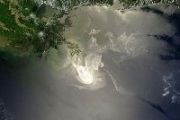Viewings: 8110

Recently scientists have found out where he had gone more than a hundred litres of oil spilled during the accident in the Gulf of Mexico in 2010 and who could not find those who were engaged in cleaning the water. In their opinion, disappeared "black gold" need to look... at the bottom of the Gulf. The oil came from a surface in a sinking bodies of dead plankton organisms.
Although almost all the experts involved in the study of the consequences of the accident that occurred on April 20, 2010 in 80 kilometers from the coast of Louisiana in the Gulf of Mexico to oil from Deepwater Horizon, say that now the flora and fauna of the Bay is not in danger, some scientists still doubt it. Indeed, the water column and coastal areas cleared of oil, and the status of coral reefs very satisfactory (but these colonies worse than all the inhabitants of the ocean carry organic water pollution). However, the researchers did not give rest to a puzzle, the answer to which is not so far.
According to experts, at the time of the explosion and the subsequent leakage in the water got about 600 million liters of oil. Now, during works on clearing of the water column and coasts, as well as treatment with the help of microorganisms managed to eliminate 450 million litres "black gold". Where were the rest of 150 million liters? They couldn "off" to the ocean - the movement of such a large spot (or many small) would be immediately noticed. In General, all of the search for the missing oil, alas, to no avail. It seemed that the oil vanished into thin air, although every schoolboy knows that this is what she can't do no oil soluble in water.
While it is understandable that nobody and never think to look for the missing oil... at the bottom of the Gulf. However, it is quite understandable - each schoolboy knows that oil, whose density varies from 0.7 to 0.9 g/cm3 still easier sea water (density - 1,025 g/cm3). Therefore, according to the laws of physics, it should float and not sink. All this is true, but only in that case when no one bothers oil to the surface. And those who do, in the sea, it is necessary to notice, enough.
As we know, the surface layers of the ocean are the habitat of many microscopic animals and plants, called phytoplankton. Billions of these tiny creatures constantly filter the water and, therefore, accumulate in our bodies everything that falls into the sea. After dying, they fall to the bottom, taking back all that had accumulated in their bodies. Hydrobiologists call this phenomenon "rain corpses" and think that this is where the ocean floor is supplied by many substances that are released into the water from the mainland. That is quite correct to say that "rain corpses" is a kind of lift, which is the transport of substances from the surface to the bottom.
And now, at a scientific conference dedicated to the Holocaust, 2010 and its consequences, which recently took place in New Orleans, it was suggested that disappeared oil need to search for it on the bottom of the Gulf. In particular, geologist Rebecca Larson from Eckerd College (USA) presented data stating that in many places plankton and other surface biological material was deposited at least ten times faster than usual, often leaving the darker layer at the bottom of the Gulf. This, in its opinion, testified that the dead organisms, falling to the bottom, carried in their bodies a little "black gold". Well, since there were billions, it is not surprising that together they were able to pull on the bottom of over a hundred liters of oil.
During another report geochemist Jeff Canton from Florida state University in Tallahassee (USA) suggested that oil could act as a catalyst, causing the particles to be grouped and massively to sink. This phenomenon is known scientists - it is called "mud storm". That is dead planktonic organisms under the action "black gold" coalesced into larger conglomerates, which took on the bottom even more oil than it could make each of them separately. And oceanographer Uta Passo from the University of California in Santa Barbara (USA) confirmed the validity of this hypothesis, telling that in laboratory experiments weathered oil from the wreck and really made the particles to stick together.
There were also presented the results of other studies, suggests that during the oil spill the water layers, which, as a rule, clouded because of the presence of large quantities of plankton were absolutely transparent - not counting sinking sticky particles. This is indirect evidence that these microscopic ocean life, dying, carried with him spilled oil. Which later was buried in sediments.
However, to check the validity of this assumption, very, very difficult - in fact, near the bottom of the body of the dead plankton organisms echoed deep currents across the Bay. So oil is dispersed on a large area. By the way, that is why, according to the report of the group of scientists of College of marine Sciences of the University of South Florida (USA), led by oceanographer David Hollander, now this oil is not harmful to benthic inhabitants, because not form large spots in the bottom sediments.
However, other scientists are not so optimistic. They believe that such spots can be, just hard enough to find. And because decomposing oil microorganisms live mainly at the surface, these islets "black gold" can be saved on a day for years. Of course, back to the surface, they will not emerge, however, can seriously affect the benthic ecosystems. And not only them - particularly from such bottom spots may suffer deep-sea fishing malacatoya fish (Malacanthidae)who live on the depth and not only eat worms and other ground beings, but buried in the sediment, facilitating its stirring...
















